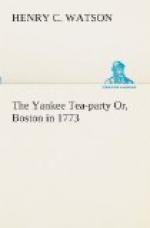They said they were not Arnolds, and that America had
no truer friends than themselves; and then seized
the emissaries and their papers and handed them over
to Wayne and the mercy of a court-martial. The
men were tried as spies, found guilty and executed.
A reward which had been offered for their apprehension
was tendered to the mutineers who had seized them.
But they refused it. One of them said that necessity
had wrung from them the act demanding justice from
Congress, but they wanted no reward for doing their
duty to their bleeding country. Congress appointed
a commissioner to meet the mutineers at Princeton,
and soon after their demands were satisfied. A
large part of the Line was disbanded for the winter,
and the remainder was well supplied with provisions
and clothing. About the middle of January, the
greater part of the New Jersey line, which was encamped
near Pompton, followed the example of the Pennsylvanians,
and revolted; but different measures were taken to
quell them. General Washington ordered General
Robert Howe to march with five hundred men, and reduce
the rebels to submission. Howe marched four days
through a deep snow, and reached the encampment of
the Jersey troops on the 27th of January. His
men were paraded in line, and he then ordered the
mutineers to appear unarmed in front of their huts,
within five minutes. They hesitated, but on a
second order, they obeyed. Three of the chief
movers in the revolt were tried and sentenced to be
shot. Two of them suffered, and the third was
pardoned as being less to blame. The two who were
shot fell by the hands of twelve of the most guilty
of the mutineers. That, I think, was piling it
on rather too thick. General Howe then addressed
them by platoons, and ordered their officers to resume
their commands. Clinton had again sent an emissary
to make offers to the mutineers; but the man heard
of the fate of the Tory and the British serjeant,
and he took his papers to General Howe instead of
the men. These Jersey mutineers were reduced to
submission, without much difficulty. But the Pennsylvanians
displayed a determination to fight if their demands
were not satisfied, and so they gained their point.”
“Perhaps,” said Hand, “the Jersey
troops had not as much reason to revolt as the Pennsylvanians.”
“I know they hadn’t as much reason,”
said Kinnison. “They had suffered as much
for want of food and clothing, but their term of service
was more certainly known.”
“How nobly the men treated the offers of Sir
Henry Clinton!” said Hand. “I should
think the British government might have learned from
that affair, the spirit of the Americans, and the
futility of efforts to conquer men with such motives
and sentiments.”
“They might have learned it if they had wished
to learn,” said Pitts. “They might
have learned the same thing from the Boston tea-party.
But they determined that they had a right to act towards
us just as they pleased, and their pride was blind
to consequences.”




